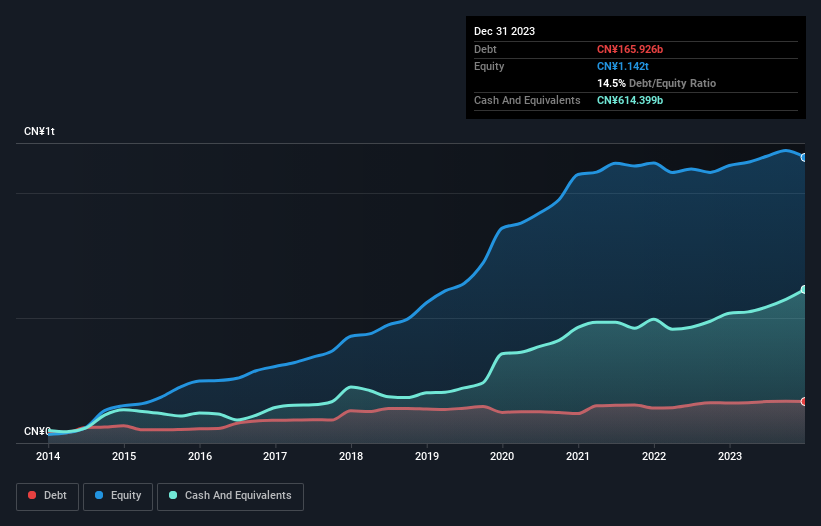We Think Alibaba Group Holding (NYSE:BABA) Can Manage Its Debt With Ease

Warren Buffett famously said, 'Volatility is far from synonymous with risk.' So it seems the smart money knows that debt - which is usually involved in bankruptcies - is a very important factor, when you assess how risky a company is. Importantly, Alibaba Group Holding Limited (NYSE:BABA) does carry debt. But should shareholders be worried about its use of debt?
When Is Debt A Problem?
Debt is a tool to help businesses grow, but if a business is incapable of paying off its lenders, then it exists at their mercy. In the worst case scenario, a company can go bankrupt if it cannot pay its creditors. However, a more frequent (but still costly) occurrence is where a company must issue shares at bargain-basement prices, permanently diluting shareholders, just to shore up its balance sheet. Of course, the upside of debt is that it often represents cheap capital, especially when it replaces dilution in a company with the ability to reinvest at high rates of return. The first thing to do when considering how much debt a business uses is to look at its cash and debt together.
Check out our latest analysis for Alibaba Group Holding
What Is Alibaba Group Holding's Net Debt?
The chart below, which you can click on for greater detail, shows that Alibaba Group Holding had CN¥165.9b in debt in December 2023; about the same as the year before. But on the other hand it also has CN¥614.4b in cash, leading to a CN¥448.5b net cash position.

How Healthy Is Alibaba Group Holding's Balance Sheet?
The latest balance sheet data shows that Alibaba Group Holding had liabilities of CN¥448.8b due within a year, and liabilities of CN¥229.8b falling due after that. On the other hand, it had cash of CN¥614.4b and CN¥64.1b worth of receivables due within a year. So these liquid assets roughly match the total liabilities.
This state of affairs indicates that Alibaba Group Holding's balance sheet looks quite solid, as its total liabilities are just about equal to its liquid assets. So while it's hard to imagine that the CN¥1.41t company is struggling for cash, we still think it's worth monitoring its balance sheet. Simply put, the fact that Alibaba Group Holding has more cash than debt is arguably a good indication that it can manage its debt safely.
Also good is that Alibaba Group Holding grew its EBIT at 20% over the last year, further increasing its ability to manage debt. When analysing debt levels, the balance sheet is the obvious place to start. But it is future earnings, more than anything, that will determine Alibaba Group Holding's ability to maintain a healthy balance sheet going forward. So if you're focused on the future you can check out this free report showing analyst profit forecasts.
But our final consideration is also important, because a company cannot pay debt with paper profits; it needs cold hard cash. While Alibaba Group Holding has net cash on its balance sheet, it's still worth taking a look at its ability to convert earnings before interest and tax (EBIT) to free cash flow, to help us understand how quickly it is building (or eroding) that cash balance. Over the last three years, Alibaba Group Holding actually produced more free cash flow than EBIT. There's nothing better than incoming cash when it comes to staying in your lenders' good graces.
Summing Up
While it is always sensible to investigate a company's debt, in this case Alibaba Group Holding has CN¥448.5b in net cash and a decent-looking balance sheet. And it impressed us with free cash flow of CN¥156b, being 122% of its EBIT. So we don't think Alibaba Group Holding's use of debt is risky. Above most other metrics, we think its important to track how fast earnings per share is growing, if at all. If you've also come to that realization, you're in luck, because today you can view this interactive graph of Alibaba Group Holding's earnings per share history for free.
At the end of the day, it's often better to focus on companies that are free from net debt. You can access our special list of such companies (all with a track record of profit growth). It's free.
New: Manage All Your Stock Portfolios in One Place
We've created the ultimate portfolio companion for stock investors, and it's free.
• Connect an unlimited number of Portfolios and see your total in one currency
• Be alerted to new Warning Signs or Risks via email or mobile
• Track the Fair Value of your stocks
Have feedback on this article? Concerned about the content? Get in touch with us directly. Alternatively, email editorial-team (at) simplywallst.com.
This article by Simply Wall St is general in nature. We provide commentary based on historical data and analyst forecasts only using an unbiased methodology and our articles are not intended to be financial advice. It does not constitute a recommendation to buy or sell any stock, and does not take account of your objectives, or your financial situation. We aim to bring you long-term focused analysis driven by fundamental data. Note that our analysis may not factor in the latest price-sensitive company announcements or qualitative material. Simply Wall St has no position in any stocks mentioned.
About NYSE:BABA
Alibaba Group Holding
Through its subsidiaries, provides technology infrastructure and marketing reach to help merchants, brands, retailers, and other businesses to engage with their users and customers in the People's Republic of China and internationally.
Very undervalued with excellent balance sheet.
Similar Companies
Market Insights
Community Narratives



